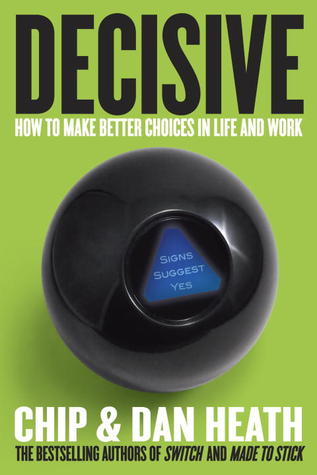What are the secrets to making better decisions?
.
We all make a lot of bad decisions.
With careers:
Via Decisive: How to Make Better Choices in Life and Work:
An American Bar Association survey found that 44% of lawyers would recommend that a young person not pursue a career in law. A study of 20,000 executive searches found that 40% of senior-level hires “are pushed out, fail or quit within 18 months.” More than half of teachers quit their jobs within four years. In fact, one study in Philadelphia schools found that a teacher was almost two times more likely to drop out than a student.
In business:
Via Decisive: How to Make Better Choices in Life and Work:
One study of corporate mergers and acquisitions— some of the highest-stakes decisions executives make— showed that 83% failed to create any value for shareholders. When another research team asked 2,207 executives to evaluate decisions in their organizations, 60% of the executives reported that bad decisions were about as frequent as good ones.
In our jobs:
Via Decisive: How to Make Better Choices in Life and Work:
A study showed that when doctors reckoned themselves “completely certain” about a diagnosis, they were wrong 40% of the time. When a group of students made estimates that they believed had only a 1% chance of being wrong, they were actually wrong 27% of the time.
And in our personal lives:
Via Decisive: How to Make Better Choices in Life and Work:
Often our guts can’t make up their minds at all: an estimated 61,535 tattoos were reversed in the United States in 2009. A British study of more than 3,000 people found that 88% of New Year’s resolutions are broken, including 68% of resolutions merely to “enjoy life more.”
In their book, Decisive: How to Make Better Choices in Life and Work, Chip and Dan Heath lay out the four key problems that lead us astray when making decisions:
- Narrow framing: Exploring few options. Seeing issues as a binary (Yes/No.)
- Confirmation bias: Only seeking information that supports your beliefs and discounting what disagrees with them.
- Short-term emotion: Letting a temporary mood affect a longer term choice.
- Overconfidence: Being way too sure you know how things will turn out.
How can we overcome each of these?
Narrow Framing:
Widen your options: What would you do if your current options disappeared? How else could you resolve the issue? Another solution is to look for others who have solved your problem and imitate them.
Confirmation bias:
Reality test your assumptions: Consider the alternative. Play devil’s advocate. Better yet, run a small test to see if your theory really works in a controlled fashion before you take big steps.
Short-term emotion:
Get some distance: Ask yourself how you’d feel about this decision 10 minutes from now, 10 months from now and 10 years from now. The long view will help you realize if you’re too caught in the moment. Another tip is to ask yourself “What would I tell my best friend to do in this situation?“
Overconfidence:
Prepare to be wrong: Take the time to sit down and really think about what could go wrong to make sure you’re ready for it.
Join 25K+ readers. Get a free weekly update via email here.
Related posts:
What 10 things should you do every day to improve your life?
What do people regret the most before they die?
What five things can make sure you never stop growing and learning?





